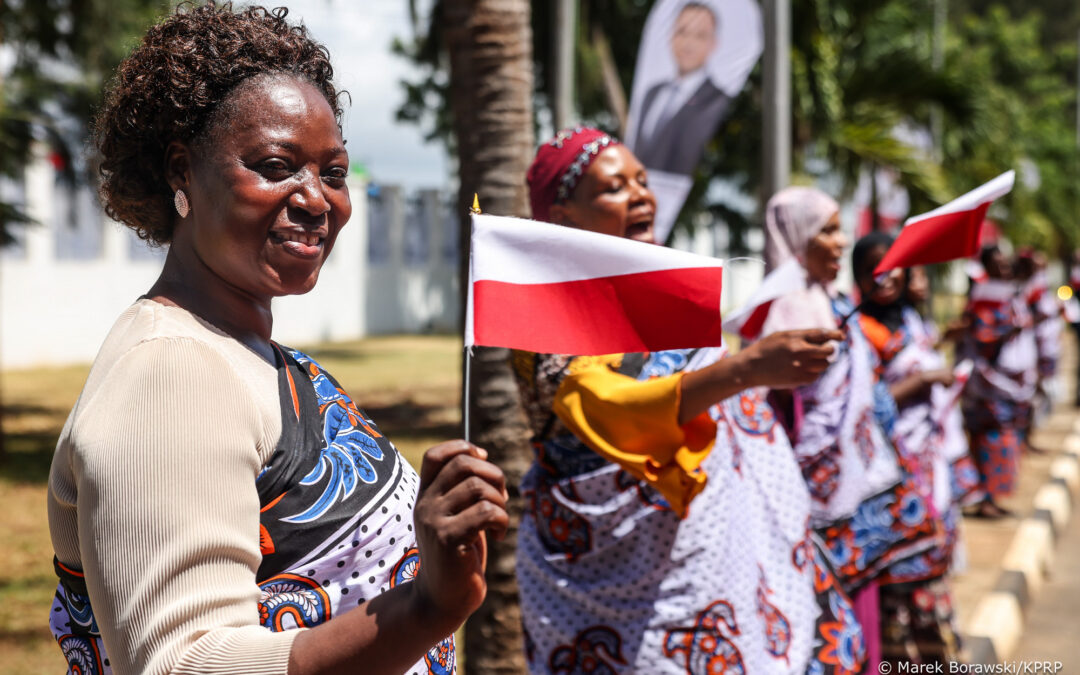By Jacek Płaza
Accusations that the president’s recent state visit to East Africa was a “holiday” are unfair. But it is true that Poland lacks a coherent and consistent strategy when it comes to boosting trade links with the continent.
Last month, President Andrzej Duda visited three East African states, Kenya, Rwanda and Tanzania, aiming to promote Poland’s brand, strengthen trade relations, as well as present the Polish perspective on the geopolitical situation in Europe, especially the implications of Russia’s aggression against Ukraine.
The visit led some critics of the president, whose final term in office ends next year, to accuse him of taking a “holiday”.
Such claims are unfair. The visit was carefully prepared in coordination between Duda’s office and the foreign ministry. His delegation included deputy foreign minister Andrzej Szejna from The Left (Lewica) – a rare sign of cooperation between the state institutions regardless of party.
Bardzo dobry felieton @estera_flieger o pogardliwych tweetach @MichalSzczerba o Afryce. Rozkładający na czynniki pierwsze problemy naszego spojrzenia na ten kontynent i na miejsce Polski w świecie. Polecam 👌https://t.co/k658OjqATd
— Michał Płociński (@michalplocinski) February 9, 2024
Yet considering the fact that Polish diplomacy has rather forgotten the continent in the last decade, it is fair to question why Warsaw lacks a thorough and coherent strategy for Africa, diplomatic support for business, and regularity of official visits. In this light, even a single visit is a step towards fixing what had been neglected.
Duda has been to Africa five times during his tenure, which began in 2015, and this was his third visit to Sub-Saharan Africa.
In each case, those trips have been motivated mainly by international politics. In 2017, when Duda went to Ethiopia, Poland was seeking support among members of African Union – which is headquartered in Addis Adaba – for its candidacy as a non-permanent member of the UN Security Council.
In 2022, Duda visited West African leaders in Nigeria, Senegal and Ivory Coast in an effort to convince them that threats to global food security were caused by Russia’s invasion of Ukraine
Of course, on each of these trips Duda stressed the importance of trade relations as well. In Ethiopia, he met with Polish investors in the country, Asseco (an IT company) and Ursus (a producer of tractors). Yet diplomatic support for Polish companies in Africa has remained insufficient.
Nairobi. 🇵🇱🇰🇪 Rozpoczyna się pierwsza w historii wizyta oficjalna polskiego Prezydenta w Kenii. pic.twitter.com/B80ulsYigu
— Kancelaria Prezydenta (@prezydentpl) February 5, 2024
Before 2015, Radosław Sikorski, then (and now again) minister of foreign affairs, did not see the point in maintaining embassies in countries where Polish exports are marginal and closed five of them – including in Senegal, Democratic Republic of Congo, Tanzania, Zimbabwe – which had serviced nearly 20 countries. Before that, embassies in Ivory Coast, Ghana, Liberia and Mali had been closed.
At the same time, his government launched a “Go Africa” program to motivate Polish exporters to more courageously explore new markets on the continent. However, the subsequent Law and Justice (PiS) government then abandoned that programme, though it did reinstate some Polish Investment and Trade Agency offices (which support Polish exporters), for example in Kenya, Nigeria and Egypt.
Duda’s visit to East Africa last month again has a broader geopolitical context, but this time also has the potential to auger a new, more consistent approach to Poland’s Africa policy.
Between 2018 and 2022, Russia was the biggest arms exporter to Africa, covering a quarter of the continent’s demand for military equipment. But after the invasion of Ukraine, Russian production needed to be diverted to the country’s own use. Poland intends to use this opportunity and try to sell arms to African states.
This could cover a wide range of products. Piorun man-portable air-defence systems – which have become an export hit after their successful use in Ukraine – are a lot cheaper and easier to buy than the legendary American Stingers. Some African states have also expressed interest in Grot assault rifles as well as in maintenance of their helicopters at centres in Poland.
Norway is buying hundreds of Piorun air-defence systems from Poland.
It becomes the third country – after the US and Estonia – to buy Pioruns, which have proved a success in Ukraine’s defence against Russia after Poland supplied them to Kyiv https://t.co/CoLuJSjUCa
— Notes from Poland 🇵🇱 (@notesfrompoland) November 30, 2022
Poland’s own unprecedented military procurement spree during the war in Ukraine – in particular from South Korea and the United States – has created more space for selling Polish stock.
Poland also has decades of experience in modernising and improving post-Soviet equipment, of which African militaries have plenty. Thus, Warsaw may seek to sell such equipment along with know-how or with a promise to invest in local assembly plants or other basic services and sub-production centres.
It is emblematic that Duda’s recent delegation to Africa included representatives of the Polish Armaments Group (PGZ), Poland’s state-owned defence industry holding company.
Nonetheless, military cooperation is a risky and delicate matter to step into. Duda’s visit last month met with controversy after he expressed support for Rwandan counterpart Paul Kagame, whose army has been engaged in military clashes with the neighbouring Democratic Republic of Congo and who is accused of supporting Tutsi paramilitary groups there. Congo’s foreign ministry expressed its unhappiness about Poland’s support for Rwanda.
DR Congo has protested "against the two-faced attitude of Poland" after President @AndrzejDuda expressed support for Rwanda during a visit to Kigalihttps://t.co/xSIuwMdf5R
— Notes from Poland 🇵🇱 (@notesfrompoland) February 15, 2024
The incident highlights the challenges Poland faces in seeking to grow its footprint in Africa. But Rwanda, where Poland has its best and most promising relations across the whole continent, also points to the potential rewards.
In 2021, the two countries signed three bilateral agreements, including one on cooperation in cybersecurity. The following year, Poland’s foreign, development and finance ministers visited Rwanda, initiating cooperation between the countries’ defence sectors. A Polish company has also acquired a major tin mill near Kigali.
These links have perhaps been helped by the fact that Rwanda’s finance minister lived for 13 years in Poland, where he graduated from Warsaw School of Economics and then got a PhD in economics from the University of Warsaw. He speaks fluent Polish.
Minister @undagijimana this morning received the Polish Deputy Minister of Finance H.E Mr. Arthur Soboń and his delegation. They discussed potential areas of development cooperation including tax policy and administration, trade and investments. pic.twitter.com/dBFmt2g8Yp
— Ministry of Finance & Economic Planning (@RwandaFinance) December 5, 2022
While Rwanda is small compared to other African states, it is often seen as a gateway to investment in the wider region.
“Rwanda has quite stringent standards of various kinds, e.g. for food products. The governments of neighboring countries know about these standards and it is easier for them to allow products on their markets,” Katarzyna Kowalska, vice-president of Poland’s export credit insurance agency, KUKE, recently told the Rzeczpospolita daily.
KUKE insures transactions for Polish exporters while BGK (Poland’s national development bank) takes on the risk of lack of payment from the local importer, paying the Polish contractor from its own pocket and then pursuing the foreign party for payment.
KUKE also supported another landmark Polish investment in West Africa, the construction of the Academy of Fisheries and Marine Sciences in Angola, which was led by the Warsaw-based Quenda Group as the general constructor and also involved a consortium of Polish exporters and subcontractors led by Gdańsk’s Torhamer. It is the biggest education project in Africa implemented by an EU member state.
Quenda’s CEO, Małgorzata Szymczuk, thinks that the key to success in such markets is to have a constant, decades-long presence. “This is the only way to learn about its specifics, as well as to build lasting relationships with local contractors,” she says.
Polish businesses are already becoming increasingly active in Africa.
And with its lack of colonial baggage and own experiences of economic transition, Poland could be well placed to expand its trade and investment links with the continent
https://t.co/936StfSex6— Notes from Poland 🇵🇱 (@notesfrompoland) October 21, 2020
KUKE has also lately undertaken cooperation with European counterparts with more experience in implementing projects in Africa. It signed a deal with the Danish EKF in 2021 for modernising hospitals in Ivory Coast (the Polish part of export contracts was worth €46.5 million) and last year with Spain’s Propav Infraestructuras that will allow Polish exporters to engage in its global value chains.
Poland’s relations with African nations can also be eased by its lack of a colonial past, as well as its own dynamic economic growth over the past three decades, which can make it a role model for developing countries. But such soft power can only be used effectively if Poland’s diplomatic presence is expanded and intensified.
Duda’s recent visit was widely reported by local media in Rwanda, Kenya and Tanzania. This is part of a Polish brand-making process that cannot be neglected if Poles, when asked “Where are you from?” and answering “Poland’”, do not want to hear every time ”Oh, Holland, great!”
The president’s tour of Africa was certainly not a milestone, but nor was it a holiday. If followed up by more intensive diplomatic activity, it can be an important step in strengthening business ties with the region.

Notes from Poland is run by a small editorial team and published by an independent, non-profit foundation that is funded through donations from our readers. We cannot do what we do without your support.
Main image credit: Marek Borawski/KRPP




















